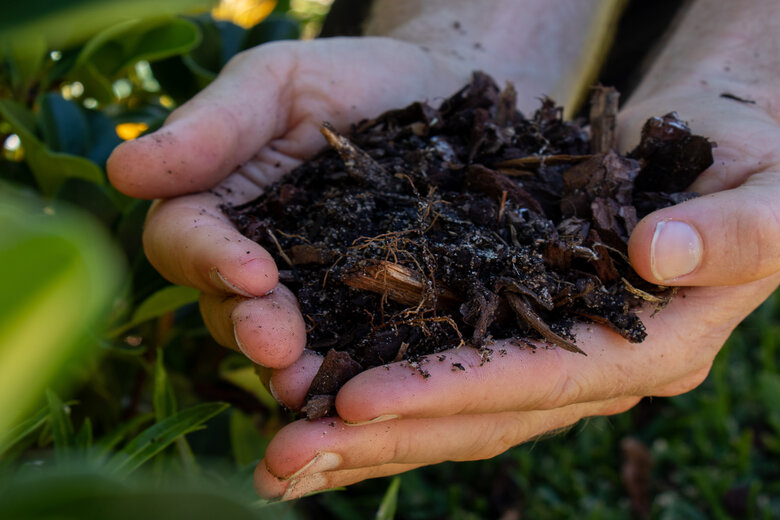
Whether it’s put to work for sustainable landscaping, improving water quality or rehabilitating roads and mines, commercial compost is helping local councils and state government agencies ensure sustainable procurement practices by boosting the use of recycled content.
Kerbside compost is currently being used for a wide variety of purposes across development and infrastructure projects, urban greening and building better roads, sporting fields and parks.
The NSW government’s $7.5 million Organics Market Development Grants program reflects the compost procurement potential for agencies like the NSW Forestry Corporation, the Department of Primary Industries, TfNSW, the Department of Regional NSW and the NPWS.
OMD grants have so far funded 38 ground-breaking projects that demonstrate the benefits of compost across a range of industries and uses including agriculture, horticulture, sporting fields, mine and roadside rehabilitation, and urban amenity.
Stormwater biofiltration
One of the more novel uses of compost has been its incorporation into urban stormwater biofiltration systems. While sand has traditionally been used as the natural material in biofiltration, compost is opening new opportunities.
In collaboration with the Centre for Organic Research and Education, City of Newcastle used an Organics Market Development Grant to trial the use of compost in stormwater biofiltration.
The trial compared compost made from 100 per cent recycled material such as food and garden organics with sand filters at two sites including a small rain garden and a large detention basin.
It found that the compost provided better nutrients for the plants and helped feed microbes under the ground, improving the soil and biodiversity of the area.
The trial also demonstrated the ability of compost to remove a wide range of pollutants including hydrocarbons (from grease and oil), excess nutrients (like phosphorus and nitrogen), sediments and heavy metals from the water.
Another grant project showed locally-sourced compost could replace up to half the imported peat normally used for mushroom growing without impacting yield or cup size.
A similar project at a Riverina almond farm demonstrated more benefits, with compost increasing kernel size by seven per cent.
Sustainability
Compost improves soil structure, increases water retention and boosts water efficiency, which means it can help reduce climate risk, reduce maintenance requirements and create a more resilient environment better able to cope with climate change and drought.
Using compost also reduces greenhouse gas emissions. When food and garden organics waste goes to landfill it produces methane – a potent greenhouse gas. Using compost helps divert a valuable resource from landfill while reducing emissions.
As such, the use of compost can help improve environmental and sustainability outcomes for developments. Another project is currently aiming to demonstrate its value in achieving sustainable building ratings, with an application submitted to Green Building Council of Australia’s Green Star rating system.
When used in landscaping development or infrastructure, compost can improve soil health – helping to establish new sites more rapidly and improving plant health and growth.
Opportunities for local government
Compost can be used at the local government level to create truly circular opportunities in a council area. Once collected from residents’ kerbsides it can be returned to the local government as a beneficial product to make healthier green spaces and better sporting fields.
Because it’s made from recycled food and garden organics, compost is a nutrient-rich source of organic matter. It boosts biological activity and improves the health and growth of grasses and plants.
Councils can make turf more resilient and able to last through the playing season by topdressing sporting fields with compost or using it to establish new fields.
As demonstrated by the City of Newcastle trial, compost can also be used in stormwater biofiltration.
Meeting procurement targets
Using compost can help government agencies achieve recycled product procurement requirements contained in the government’s Waste and Sustainable Materials Strategy.
The strategy includes requirements for government agencies to use recycled content in procurement on an ‘if not, why not’ basis.
“The NSW Government can use its purchasing power to stimulate circular economy innovation and demand for recycled content, recycling markets,” the strategy states.
“This will drive better waste and recycling outcomes and potentially reduce our carbon footprint by using fewer virgin materials.
“Agencies will need to preference recycled content where there is no significant additional cost or negative impacts on performance and the environment”.
Compost is made from recycled food and garden waste and is fully recycled, so government agencies requiring a soil enhancer or land rehabilitation product can be confident they’re ticking the right box by using it.
Cool Compost
The NSW EPA has partnered with independent not-for-profit Circular Australia to deliver the Cool Compost program, a digital platform designed to support businesses and organisations looking for circular solutions.
A one-stop online resource centre for existing and new customers of quality commercial compost, Cool Compost builds on the success and innovation of the OMD program and aims to help create strong markets for the increasing supply of compost made from kerbside food and garden waste.
Comment below to have your say on this story.
If you have a news story or tip-off, get in touch at editorial@governmentnews.com.au.
Sign up to the Government News newsletter
Anthony Gleeson on: Victorian infrastructure set to fail as climate change bites: report
Sue Phillips on: 15 councils participate in SA emissions reduction trial
Garth Daddy on: War memorial contracts fudged, audit finds